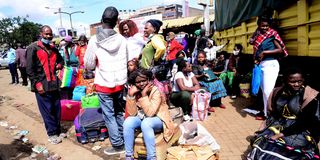Watch out: Experts warn that Covid-19 rates may rise with festivities

People at Machakos Country Bus Station in Nairobi wait to travel to western Kenya in this photo dated December 20, 2020.
Just when many thought this year would be different, what with calls for people to avoid travelling upcountry for Christmas festivities to avoid spreading Covid-19, a spot check shows people are travelling en masse.
The Nation found at Nairobi’s upcountry bus termini that there is increased movement of people from the capital city, which remains the epicentre of Sars-CoV-2.
Experts warn that the risk of transmission of Covid-19 may be too high and the rate of hospitalisation will likely go up during and after the festivities.
Though statistics show Covid-19 has been falling over the past several weeks in Kenya, cases are expected to spike as from early January.
“People will transport the virus home. The cases will likely go up early in January if testing remains constant,” said Dr Bernard Muia, a public health expert and former Health minister with the Nairobi County Government.
Breaching protocols
The Nation observed that people are breaching protocols such as social distancing, use of masks, hand-washing and sanitisers among passengers at the stations.
With research showing a person needs only 15 minutes around an infected person to contract the virus, it is highly likely public service vehicles, private cars and all other means of transport will be a conduit for spreading SarS-CoV-2.
“Increased movements and interactions will lead to a new wave, which will likely spike towards the end of January with the reopening of schools and workplaces. But if mitigation is done in terms of masking, social distancing and hygiene, the surge of a third wave may be minimised,” said Dr Ahmed Kalebi, a pathologist, and CEO of Lancet Group of Laboratories.
According to Dr Muia, the country may soon start seeing intra and inter-family infections.
We are not prepared for a surge.
The hospitalisation rate may worsen, said Dr Githinji Gitahi, the Global CEO of Amref Health Africa.
He said the country is not prepared for another peak, which may be aggravated by the ongoing health workers’ strike.
“We are not prepared for a surge. Health-care workers are on strike and health facilities need to be well-resourced. The human resources should be made available as well as oxygen and personal protective equipment,” he said.
He said many people died while being moved around in search of oxygen, which is still lacking in many hospitals.
According to him, fatalities from Covid-19 will likely go up in the New Year and the situation may be compounded by the ongoing strikes.
“The strikes will worsen the situation in terms of disease surveillance, management and testing. Deaths will increase because there is no one taking care of the critically sick patients,”
said Dr Muia.
Next year
Dr Muia added that the strikes and the Christmas and New Year festivities will significantly be felt early next year.
The strike is occurring at a time when the curve is “heading to its trough” and the infections and deaths are low, said Dr Kalebi.
The infection rate has gone down to less than seven per cent for three straight days and will likely decline further through a ‘natural process’ if people observe public health measures and protocols.
Yesterday, the rate was 4.5 per cent after 114 people tested positive for the virus from a sample of 2,507.
“Until widespread vaccination is done, the usual measures of masking, social distancing, avoiding crowds, hand washing and sanitisation as well as ventilation in closed spaces will work,” said Dr Kalebi.
Urge people
The doctors said it is unnecessary to lock down the country at this time but insisted it is very important for the government to urge the public to adhere to health protocols, heighten surveillance and dissemination of key messages.
However, Dr Gitahi, who is a member of the Covid-19 National Task Force, speaking in personal capacity, said curfew hours should be moved from 10.00pm to 7.00pm from December 24 to January 2, 2021.
“This will help reduce gatherings, especially in the bars, where transmission is likely to be high. It should be a short-term measure to control the spread,” he said.
Despite calls by the Council of Governors to impose lockdowns on
Covid-19 epicentres, the country still remains open and people will continue to travel for holiday.
The experts called for a quick resolution to healthcare disputes so that doctors and workers may go back to work to be on the lookout for a surge, especially from the festivities.
“For as long as the cases do not surge, the impact of the strike will be much less. Hopefully, it will be resolved soon before a new wave starts at the end of January or early February,” said Dr Kalebi.
According Dr Muia, Covid-19 is here to stay and people must learn how to stay with it by taking control of their health and caring for their families.





